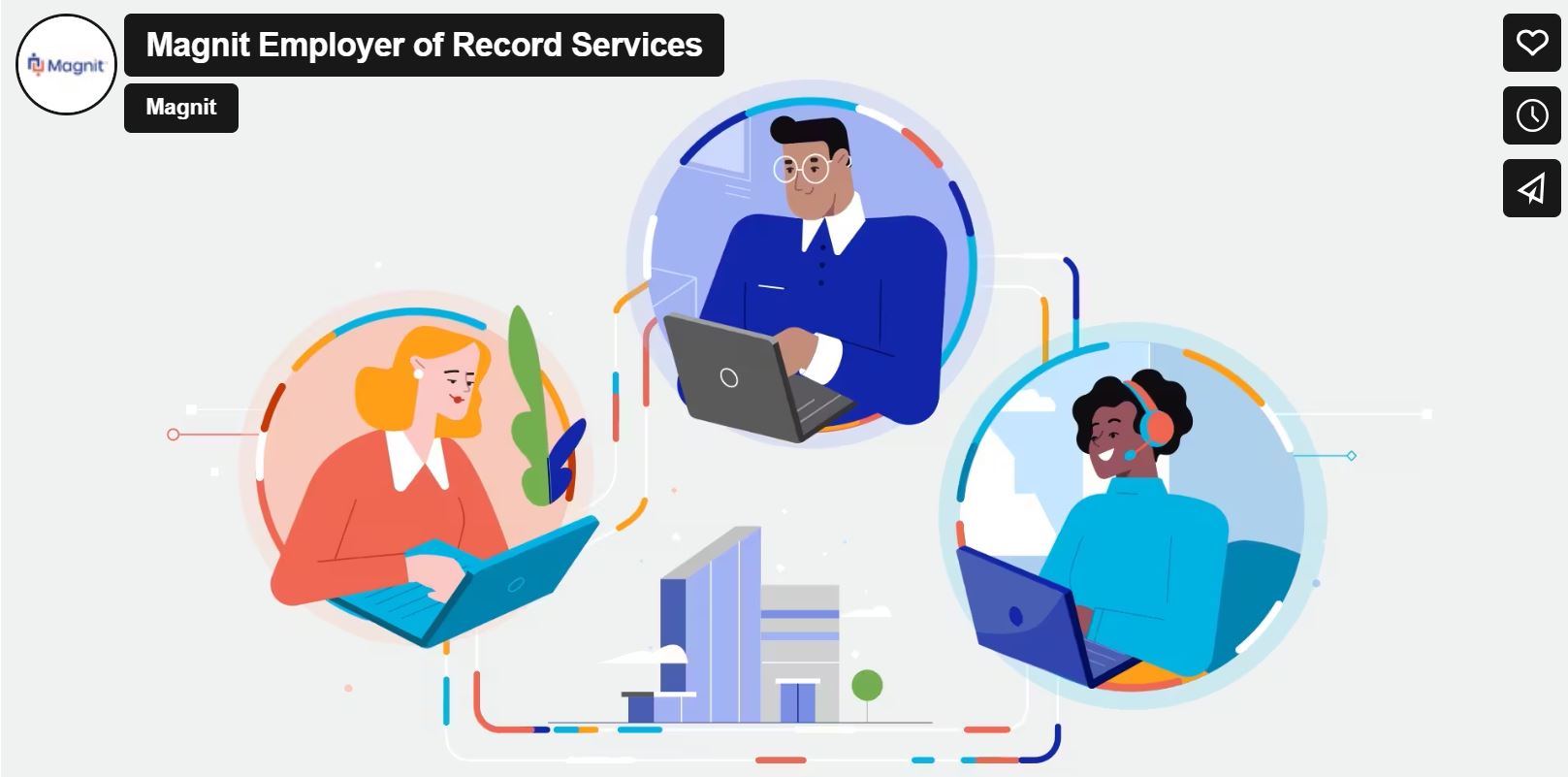What is an Employer of Record (EOR)? A Comprehensive Guide
Magnit July 4 2023

As organizations increasingly rely on contingent workers to maintain business operations and stay flexible, they face challenges related to employee misclassification and co-employment risk. If mishandled, this can be detrimental, as it could result in serious financial consequences, including hefty fines and legal liabilities.
To manage co-employment risk more efficiently, many organizations turn to an Employer of Record (EOR) partner to help them navigate the complex regulatory landscape. But before they do so, organizations need to know what to expect from an EOR and how to choose the right EOR partner for their business.
What is an Employer of Record (EOR)?
An Employer of Record (EOR) is an organization that takes on the role of managing payroll, benefits, and risk management for a company's employees on its behalf, relieving the company of these responsibilities. By partnering with an employer of record, organizations can delegate the tasks associated with payroll processing, benefits administration, and risk mitigation. The EOR also assumes the responsibility of ensuring strict compliance with local labor laws and regulations. This includes staying up to date with legal requirements, managing employee benefits and compensation, and implementing measures to minimize potential risks.
Learn more about Magnit Employer of Record in the video below:
Advantages of using an Employer of Record
- Abiding by Compliance and Labor Regulations:
An EOR can help successfully meet all regulatory compliance requirements by providing ongoing legal expertise, including for those operating in various locations and countries. This can cover validation, visibility into total spend, process standardization, ongoing reviews, support and education.
- Improved Risk Mitigation:
Employer of Records help mitigate risk to the business as they assume the legal responsibility of ensuring compliance with local laws, handling payroll, taxes and HR. This adds protection to the business from potential lawsuits and financial penalties associated with co-employment risk.
- Additional Cost Savings:
An EOR can help reduce costs to the business on each engagement with a worker by avoiding agency markups. In addition, employer of record providers like Magnit reduce program costs by providing full data visibility integrated with market intelligence, which empowers companies to make hiring and retention decisions optimized for cost.
- Improved Worker Experience:
The right EOR company can help significantly improve an organization’s worker experience. This can include comprehensive health and wellness benefits, 401k options, pension plans and more. In addition, real-time and on-demand pay can also help contribute to an excellent worker experience, and as a result, have a positive impact on employer brand.
How does an Employer of Record work?
- Signing the EOR Agreement
The services provider and organization sign a contractual agreement, which includes an outline of the services, pricing, duration and various other terms and conditions. Once the contract is signed and formalized, the EOR will begin providing their agreed upon services to the company. - Hiring your Contingent Workforce
EORs are designated as the legal employer of workers on behalf of the organization, handling all administrative and HR-related tasks. - Employer of Record Benefits Packages and Payroll Management
The EOR provides benefits on behalf of the business, which can include health insurance, paid time off, retirement savings options, and others based on the local laws and the organization.
EORs also take on all payrolling processing on behalf of the company. This includes handling taxes, calculating worker wages, issuing paychecks, ensuring compliance with local rules and regulations, and maintaining payroll records. - Contingent Workforce Management
The EOR manages the admin and legal aspects of the contingent workforce, including comprehensive payroll, onboarding and offboarding, benefits and more.
Common Employer of Record Misconceptions
Business size
Organizations ranging in size from small startup to large global organizations can all utilize EORs based on their unique, individual needs.
It’s too expensive
EOR pricing models are based on the number of workers covered, location, and specific EOR services included. Therefore, it is always best to get a quote from the EOR to fully understand the pricing model and get a realistic idea on the resources required for your business.
How do you choose the right EOR?
Industry
It’s important to seek out an EOR that has experience and expertise in your specific industry. Carefully consider their track record of successfully supporting companies within your sector, especially because that industry-specific knowledge can greatly contribute to seamless payroll, benefits, and compliance management.
Pricing Packages
When evaluating an organization, prioritizing pricing transparency is key. This is especially important when EORs work with specific staffing partners, as that can mean hidden fees and staffing agency markups. Partnering with a vendor-neutral EOR organization helps avoid such fees, drives costs savings and ensures the organization gets the best talent at the most competitive rates. Therefore, it is advisable to inquire about an employer of record's pricing structure and model to avoid any misunderstandings ahead of time.
Location
Many organizations are now operating in multiple locations globally. Choosing an inexperienced partner can lead to increased delays and expenses, since they will need additional time and resources to get acquainted with your target regions, resulting in reduced efficiencies. On the other hand, collaborating with an experienced partner ensures that it will have the critical knowledge and capabilities to provide effective solutions in the regions where you intend to hire. By partnering with a reputable EOR for payroll services, your organization can achieve cost savings, ensure compliance, and streamline operations - regardless of geographical location.
Learn more about how to choose the right EOR (Employer or Record.)
Frequently Asked Questions
1. What are the advantages of working with an EOR?
Working with an EOR provides companies numerous benefits, including:
- Meeting compliance requirements
- Mitigating risk to the business
- Increasing cost savings
- Attracting and retaining top talent
- Elevating the worker experience
Learn more about Magnit EOR in our solution brief.
2. How is an EOR different than a staffing agency?
EORs and staffing agencies serve different purposes and functions. When it comes to the relationship between worker and EOR, the EOR holds a legal relationship with the worker on behalf of the business, taking on responsibilities including payroll, compliance, and benefits. EORs also handle managing onboarding and offboarding, HR administration and employment contracts.
Staffing agencies, on the other hand, aid in matching candidates to positions in the business and primarily focus on recruiting. Once a staffing agency helps place a worker, the company takes on managing his or her responsibilities. The staffing agency typically is only involved on a short-term basis until the worker is placed in the company’s position.
Traditionally, EORs provide more access to global markets and talent than staffing agencies, since they can expand without setting up local entities and have the ability to hire workers from larger global talent pools. Staffing agencies, however, might be limited by the ability to comply within local regulations and therefore have reduced access to talent. In addition, it is important to note EORs also have more cost-effective payroll and administration than staffing agencies.
3. Do I still have direct control over my employees even if they’re hired through an EOR?
Yes. The EOR only handles employment-related worker tasks like administrating HR, contracts, onboarding and offboarding, payroll and benefits support. The organization is in charge of designating the worker’s responsibilities.
4. What types of organizations typically leverage EOR services?
Various businesses across sizes and industries utilize EOR services, including but not limited to:
- Small businesses, which leverage EOR services to better manage their workforces while saving on costs, especially in the instances they don’t have their own dedicated human resources department.
- Global and remote companies, which rely on EOR organizations to ensure they remain compliant with local laws in the different countries and locations they operate in.
- Professional services and consulting firms, which utilize EORs to help manage their workers, as they often work on a project-by-project basis.
5. How much does an EOR cost?
Pricing for EOR depends on a few different factors, including the number of workers involved, where they are located, and the services being used. EOR services pricing is based on a fee structure, which could include setup fees and costs for particular services or requirements specific to certain countries. It is best to consult with the company you are considering to better understand their pricing structure and get a quote for your organization’s specific EOR needs.
6. What does EOR stand for?
EOR stands for "Employer of Record"!
Working with an Employer of Record can help companies reduce risk, increase cost savings, and significantly improve worker experience. But before choosing an EOR partner, companies need to ask the right questions and conduct their own research to find the best EOR for their business.
Discover how one leading fashion retailer achieved $929K in cost savings and 36 FTE conversions with Magnit EOR in our case study.
Interested in learning more about Magnit EOR? Contact us.
Disclaimer: The content in this blog post is for informational purposes only and cannot be construed as specific legal advice or as a substitute for legal advice. The blog post reflects the opinion of Magnit and is not to be construed as legal solutions and positions. Contact an attorney for specific advice and guidance for specific issues or questions.

